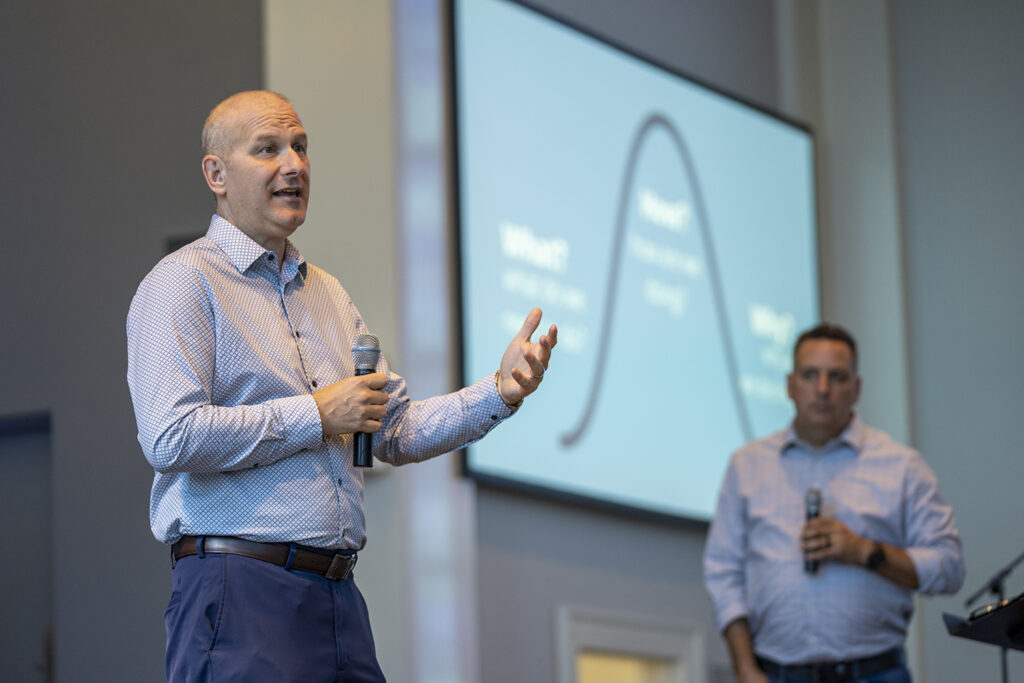RevTalk focuses on evangelism, discipleship in church revitalization

NASHVILLE – Church revitalization must be grounded in evangelism and discipleship, leaders said at RevTalk, an event sponsored by Southwestern Baptist Theological Seminary’s Center for Church Revitalization in partnership with Lifeway Research and the Replanting Team of the North American Mission Board, June 13.
Hosted at First Baptist Church of Donelson in Nashville as Southern Baptists began to gather for the Southern Baptist Convention annual meeting, the event was attended by pastors, church planters, and state convention leaders in church revitalization. Kenneth Priest, interim director of the Center for Church Revitalization, said the entire process of revitalization involves evangelism, the reason for evangelism and discipleship, and the purpose for discipleship.
“Success in evangelism comes in doing it,” said Matt Queen, L.R. Scarborough Chair of Evangelism (“Chair of Fire”) at Southwestern Seminary. “The only failure in evangelism is not doing it.”
Queen said church leaders should assess the data of their church’s five-year baptism-to-church membership ratio and determine whether the number is increasing or decreasing. This number should be kept in front of church members because “if they don’t see that number, then they aren’t thinking about that number,” said Queen.
“God is calling you to put before the people the passion and mission of God to see people come to faith in Christ,” Queen said. He encouraged pastors to consistently provide evangelistic training to their church members and celebrate evangelistic attempts and professions of faith.
Scott McConnell, Lifeway’s director of research, said intentionally discipling the next generation is necessary. McConnell shared research that shows when left to their own decisions, 66 percent of Protestant young adults aged 18-22 who were in church for at least a year in high school will step away from church for at least a year.
“All that discipling activity that we do in church is not as effective as it can be when that many people are stepping away from church,” said McConnell. “We have to make sure the faith we are verbalizing is lived out and they see this is real and this works. This is a way of living that works in today’s time. We have to be continually discipling the next generation as well as new believers.”
Additionally, McConnell encouraged the leaders to nurture those who are a part of the church membership because God entrusted those people to pastors and they need to be discipled.
Kenneth Hemphill, seventh president of Southwestern Seminary, said he believes “small groups are the key to all church discipleship.” Hemphill, emphasizing the importance of small groups, encouraged churches to form Great Commission revitalization teams within their small groups. Each team would focus on outreach, assimilation, and teaching to encourage church members to return to church post-COVID.
“Organize your Sunday school around who you are trying to reach, not who you already have,” said Hemphill.
Priest was joined by Bob Bickford, associate director of the Replanting Team of the North American Mission Board, to discuss whether revitalizing or replanting is the best option for a church in decline.
Priest and Bickford explained revitalization involves coaching and entering into covenants for the purpose of renewal; while replanting is starting over, including new leaders and processes, and the church reverting to a mission status.
Bickford, who works with churches when they are on the decline, said “the work that most churches want is that of revitalization because replanting is hospice unto something else.”
Churches that have plateaued must “dream again” or they will enter into a decline and then it is necessary to determine how to assist, Bickford said.
Priest said when churches begin to decline and do not ask why, the possible reasons include pride of the pastor and the church and fear of someone coming in to take over.
“Our prayer is that pastors would never call us,” said Priest. “Meaning they observed what was going on and addressed the problems.”



